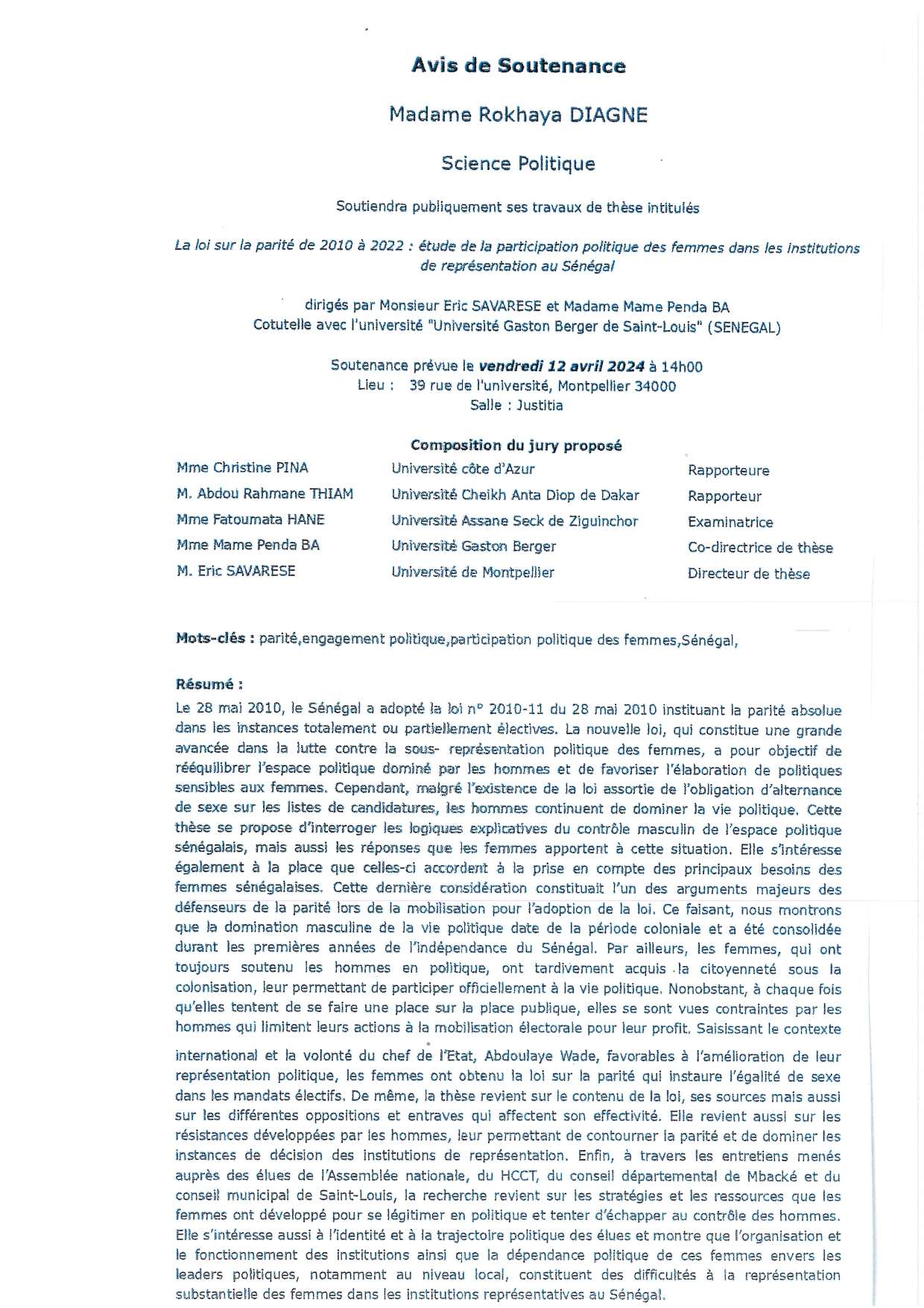Rokaya Diagne's thesis defense
Ms. Rokhaya DIAGNE will publicly defend her thesis entitled
La loi sur la parité de 2010 à 2022: étude de la participation politique des femmes dans les institutions de représentation au Sénégal, directed by Mr. Eric Savarese and Ms. Mame Penda BA, Cotutelle with the Université Gaston Berger de Saint-Louis (SENEGAL) on Friday April 12, 2024 at 2pm, Salle Justicia.
The jury is composed of :
Mrs Christine PINA - Université côte d'Azur - Rapporteur
Mr Abdou Rahmane THIAM - Université Cheikh Anta Diop de Dakar -
Rapporteur
Ms FatoumataHANE - Université Assane Seck de Ziguinchor - Examiner
Ms Mame Penda BA - Gaston Berger University - Thesis co-director
Mr Eric SAVARESE - University of Montpellier - Thesis supervisor
Keywords: parity, political commitment, women's political participation, Senegal
Summary:
On May 28, 2010, Senegal adopted Act no. 2010-11 of May 28, 2010 instituting absolute parity in fully or partially elective bodies. The new law, which represents a major step forward in the fight against the political under-representation of women, aims to rebalance the male-dominated political arena and encourage the development of gender-sensitive policies. However, despite the existence of the law and the requirement for alternating genders on candidate lists, men continue to dominate political life. This thesis sets out to examine the reasons behind men's control of the Senegalese political arena, as well as women's responses to this situation. It also looks at the role women play in addressing the main needs of Senegalese women. This last consideration was one of the major arguments put forward by parity advocates during the mobilization for the adoption of the law. In so doing, we show that male domination of political life dates back to the colonial period and was consolidated during the first years of Senegal's independence. Moreover, women, who have always supported men in politics, were late in acquiring citizenship under colonial rule, enabling them to participate officially in political life. Nevertheless, every time they try to make a place for themselves in the public arena, they are constrained by men who limit their actions to electoral mobilization for their own benefit. Seizing the international context and the will of the Head of State, Abdoulaye Wade, to improve their political representation, women obtained the law on parity which institutes gender equality in elective mandates. The thesis also looks at the law's content and sources, as well as the various oppositions and obstacles affecting its effectiveness. It also looks at the resistance developed by men, enabling them to circumvent parity and dominate the decision-making bodies of representative institutions. Finally, through interviews with women elected to the National Assembly, the HCCT, the Mbacké departmental council and the Saint-Louis municipal council, the research looks at the strategies and resources women have developed to legitimize themselves in politics and attempt to escape male control. It also looks at the identity and political trajectory of elected women and shows that the organization and functioning of institutions, as well as the political dependence of these women on political leaders, particularly at local level, constitute difficulties to the substantial representation of women in representative institutions in Senegal.
